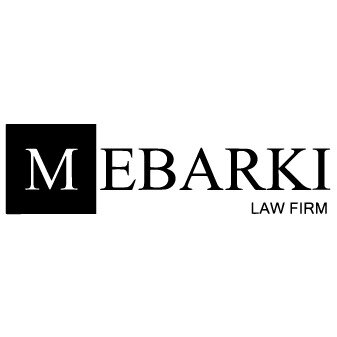Best Climate Change Law Lawyers in Algeria
Share your needs with us, get contacted by law firms.
Free. Takes 2 min.
Or refine your search by selecting a city:
List of the best lawyers in Algeria
About Climate Change Law in Algeria
Climate Change Law in Algeria refers to the legislative and regulatory framework established to address the impacts of climate change, promote sustainable development, and meet Algeria’s international commitments under agreements such as the Paris Agreement. Algeria’s climate change legal structure is continually evolving as awareness of environmental challenges grows. The law covers areas such as emissions controls, renewable energy incentives, climate adaptation measures, conservation, and the regulation of activities that can negatively affect the climate.
Why You May Need a Lawyer
Individuals, companies, and organizations may require legal assistance with Climate Change Law in Algeria for several reasons. Some common situations include:
- Interpreting and complying with complex environmental regulations and climate change policies
- Navigating permits or approvals for projects that impact air, water, or land use
- Defending against environmental enforcement actions or penalties
- Seeking advice on developing renewable energy projects or investing in green technology
- Addressing disputes arising from environmental impact or climate-related business risks
- Filing complaints about environmental harm or seeking compensation for damages
- Advising on corporate climate responsibility, disclosure, and reporting obligations
- Representing stakeholders in public consultations on new climate policies
Local Laws Overview
Algeria’s climate change legal landscape combines national policies, sector-specific regulations, and international obligations. Key aspects include:
- National Climate Change Strategy: Algeria’s “National Climate Plan” sets out targets for greenhouse gas emissions reductions, renewable energy use, and adaptation strategies.
- Environmental Protection Act: Core legislation such as Law 03-10 (Protection of the Environment within the Framework of Sustainable Development) establishes general requirements for environmental impact assessments and pollution control.
- National Program for New Renewable Energies and Energy Efficiency (PNEREE): This drives investments and regulatory incentives for clean energy development.
- Sectoral Regulations: Ministries issue sector-specific rules affecting agriculture, industry, and energy, including emission standards and reporting duties.
- International Commitments: Algeria is a signatory to key treaties, including the Paris Agreement, translating international obligations into national law and policy.
- Enforcement and Oversight: Several government bodies oversee enforcement, such as the Ministry of Environment and Renewable Energies and the National Agency for Climate Change.
Frequently Asked Questions
What is the scope of Climate Change Law in Algeria?
Climate Change Law in Algeria regulates activities affecting the environment, manages greenhouse gas emissions, directs the transition to clean energy, and establishes adaptation and mitigation frameworks.
Who enforces climate change law in Algeria?
Enforcement is primarily handled by the Ministry of Environment and Renewable Energies, together with agencies such as the National Agency for Climate Change and local environmental inspection authorities.
Do businesses have mandatory climate reporting obligations?
Some sectors require annual emissions reporting and environmental disclosures, especially if they operate in energy, petrochemicals, or large-scale manufacturing.
Are there incentives for renewable energy projects?
Yes. Algeria offers tax breaks, subsidies, and command and control incentives to encourage renewable energy project development and technology adoption.
Is an Environmental Impact Assessment (EIA) required for new projects?
Most projects likely to impact the environment must undergo an Environmental Impact Assessment as a prerequisite to receiving permits or approvals.
How does Algeria address adaptation to climate impacts?
Algeria’s National Climate Plan includes adaptation measures such as water conservation, infrastructure resilience, and programs to support communities vulnerable to climate change.
What are common penalties for violating climate change regulations?
Penalties can include fines, suspension of project activities, closure of facilities, or legal proceedings, depending on the severity of the violation.
Can individuals file complaints about environmental or climate harm?
Yes. Citizens and organizations can file administrative complaints with relevant environmental authorities or pursue claims in judicial courts.
Are there special requirements for foreign investors in green technology?
While foreign investment is generally encouraged, certain projects may require additional approvals and compliance with local content requirements or environmental standards.
Where can I find up-to-date information on Algeria’s climate laws?
Government publications, official gazettes, and reputable legal databases provide current information. Consulting a local climate law practitioner is also strongly advised.
Additional Resources
If you need more information or current regulations, the following resources can be helpful:
- Ministry of Environment and Renewable Energies - The primary government body responsible for environmental and climate policy
- National Agency for Climate Change (ANCC) - Focal point for climate programs, emissions inventory, and project oversight
- Algerian National Climate Plan - Strategy document outlining Algeria’s adaptation and mitigation targets
- Local Bar Associations - Can refer you to legal experts in climate and environmental law
- United Nations Framework Convention on Climate Change (UNFCCC) Algerian focal point - For international agreements and compliance
Next Steps
If you believe you need legal advice concerning Climate Change Law in Algeria, consider the following steps:
- Gather documentation related to your situation, such as permits, contracts, or official correspondence
- Identify the main legal questions or challenges you face
- Contact a qualified lawyer specializing in environmental or climate law, ideally with experience in Algerian regulations
- Request an initial consultation to review your options and determine your next actions
- Follow up with relevant authorities if administrative processes are required
- Stay informed about new regulatory developments that may impact your rights or obligations
Legal matters related to climate change can be complex, but timely advice from a specialist can help you comply with the law and protect your interests.
Lawzana helps you find the best lawyers and law firms in Algeria through a curated and pre-screened list of qualified legal professionals. Our platform offers rankings and detailed profiles of attorneys and law firms, allowing you to compare based on practice areas, including Climate Change Law, experience, and client feedback.
Each profile includes a description of the firm's areas of practice, client reviews, team members and partners, year of establishment, spoken languages, office locations, contact information, social media presence, and any published articles or resources. Most firms on our platform speak English and are experienced in both local and international legal matters.
Get a quote from top-rated law firms in Algeria — quickly, securely, and without unnecessary hassle.
Disclaimer:
The information provided on this page is for general informational purposes only and does not constitute legal advice. While we strive to ensure the accuracy and relevance of the content, legal information may change over time, and interpretations of the law can vary. You should always consult with a qualified legal professional for advice specific to your situation.
We disclaim all liability for actions taken or not taken based on the content of this page. If you believe any information is incorrect or outdated, please contact us, and we will review and update it where appropriate.
Browse climate change law law firms by city in Algeria
Refine your search by selecting a city.












